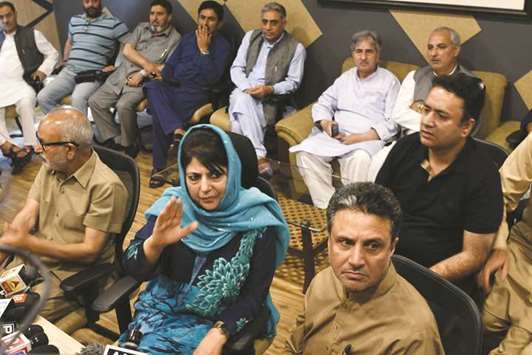Jammu and Kashmir was pushed into a major political crisis yesterday after the Bharatiya Janata Party suddenly pulled out of the ruling coalition with the Peoples Democratic Party, bringing down Chief Minister Mehbooba Mufti’s 27-month-old government amid surging violence in the state.
The BJP’s decision, which surprised the PDP and came days after the central government decided not to extend a Ramadan ceasefire, made another round of Governor’s Rule imminent in the state where no political group or alliance won enough seats in the December 2014 elections to form a government on its own.
Mufti stepped down as the chief minister immediately after the BJP announced its decision in a televised news conference. She made it clear that the PDP wasn’t interested in forming an alliance with the National Conference or the Congress for a new government.
BJP general secretary Ram Madhav, announcing his party’s decision in Delhi, said the state government had failed to curb growing terror and radicalisation in the Kashmir Valley, making the continuance of its alliance with the PDP “untenable”.
Madhav said the murder of senior Kashmiri journalist Shujaat Bukhari in Srinagar showed how serious the situation was in Kashmir.
“Three years ago, the BJP formed a government in Jammu and Kashmir with the PDP with some goals. But it has become untenable for the BJP to continue the alliance in the situation that has developed today,” Madhav said.
“Terrorism and violence have increased in the valley and radicalisation is fast spreading. Fundamental rights of citizens and right to free speech of people have come under threat in the valley as symbolised by the murder of ... Bukhari in broad daylight,” Madhav said.
Immediately after learning about the BJP’s decision, Mufti rushed to the Raj Bhavan and submitted her resignation to Governor N N Vohra - who has already had three stints of enjoying chief minister’s executive powers in 2008, 2015 and 2016.
The political crisis set the stage of another round of Governor’s Rule in the state which has seen three such administrations since 2008 and seven since 1977.
No regional or national party has 45 seats in the 89-member assembly. The PDP emerged as the single largest party with 28 seats, followed by the BJP with 25 in the last elections. The National Conference won 15 and the Congress 12.
The BJP and the PDP came together after weeks of negotiations and formed the government on March 1, 2015. The alliance, which brought the ideologically different parties together, was always rocky.
After her father’s death on January 1, 2016, Mufti reluctantly continued the PDP’s alliance with the BJP and formed a new government only on April 4, 2016.
Their ties worsened in April this year after the gangrape and murder of an eight-year-old girl from the nomadic Muslim community in Kathua district near Jammu.
With Governor Vohra’s tenure, which began at the height of the deadly Amarnath land row on June 25, 2008, set to conclude by the month end, sources in Delhi said he was likely to get an extension of at least six months to enable a smooth transition of administration in the troubled state.
The president of India, unlike in other states, cannot rule directly the state which has its own constitution. A governor in the absence of an elected government draws executive powers but has no legislative authority even as he or she can pass ordinances which necessarily have to be passed by an elected assembly.
The BJP said it has recommended Governor’s Rule in the state “keeping in mind that Jammu and Kashmir is an integral part of India.”

Mehbooba Mufti speaks during a press conference after submitting her resignation in Srinagar yesterday.
